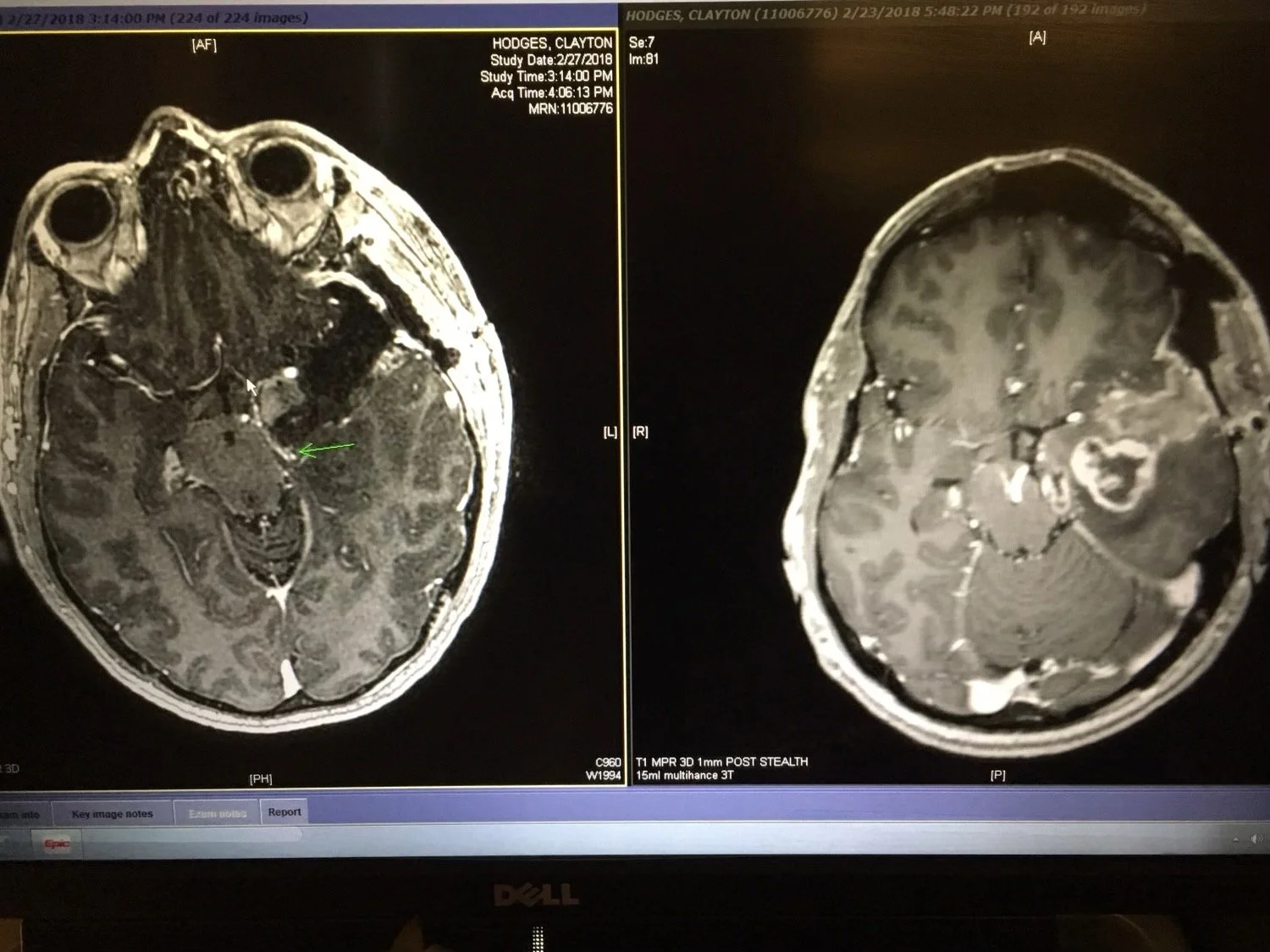Post 5
Clayton’s diagnosis was terminal. Glioblastoma in his left frontal and left temporal lobes. Stage Four with a 95% chance of death within five years, a 75% chance he would be dead within the year. Eleven months was the average. Still, we fought. Three surgeries, chemo, radiation, a magic hat, leukapheresis, another surgery, we didn’t make it to the clinical trials.
Halfway through this gauntlet, we’d gone to see Michael Eselun, the chaplain at the Simms Mann Center at UCLA, speak about the journey of cancer, about faith and rebuilding life around a “new normal.” I sat through his lecture in quiet despair and when the Q&A began, I raised my hand and confronted him about The Book of Job.
I’ve always found The Book of Job to be problematic, pretty much pushing me into atheism from the age of fourteen until my mid-twenties but since I don’t know how long it’s been since you fidgeted through Sunday school, a refresher course may be in order.
I’ll start at the beginning.
Job and his perfect family are healthy, wealthy and loved. Trouble begins when Satan asks God’s permission to destroy Job. God grants Satan’s request and thus begins a sorrowful exploration of faith in the face of great misery.
Satan, with God fully aware, proceeds to murder Job’s children, rob him of his wealth and wife, strike him with boils then refuses to give him the peace of death. This portion of the story takes all of five little verses to recant. Five! To lose his wealth, his land, his herds, his children, his home, everything!
Just remember this: Our deepest miseries, the most profound events of our lives, the moments we hold to the light like diamonds will, in the end, measure up to about five verses in a forty-two chapter book. The other forty-two chapters and seventeen verses will go on to explore the mysteries of God, which might lead one to believe that God has well, a God complex…but I digress.
Through it all, Job holds to his belief in a just and righteous God while attempting to rationalize or, at the least, understand why he must suffer. God watches silently from above. Finally, after much dialogue with false comforters, God appears in a whirlwind to Job. Job abhors himself and repents and is then restored to his former glory.
The End.
Okay, wait, did y’all get that last part though? Those five little infuriating words: “restored to his former glory” just zipping past you, like blood-thirsty lions disguised as loping gazelles?
Let me break that down.
After surviving tremendous grief, our God-granted “reward” is to be handed, once again, the potential for searing pain. Our “gift” is to love when we will be left, bear children who will be killed, plant when the floods will come.
In my humble opinion, The Book of Job is a horror story.
Standing in the theater at UCLA, I asked Michael outright, why in the world would I ever want to be restored, to rebuild, knowing everything could, no, that everything definitely would just be obliterated again? I argued very clearly that on the other side of any joy that might come, any happiness that might be created, was death, just waiting in the wings. What was the fucking point?
I realize now I was suicidal.
I realize now Michael could hear that in my voice.
He said, “There’s been moments when an exit seemed like the better choice…but my friend didn’t say ‘Look at all you’ve got to live for, look how many people love you’ she said, ‘How would you do it?’ She heard me and I was almost instantly healed by that connection.”
And that, my friends, is the moment Michael became my chaplain. I wasn’t instantly healed but I was heard and I knew I needed to keep talking. Actually, yelling.
On the car ride back to our North Hollywood apartment, I was overwhelmed by my complete inability to stop the freight train bearing down upon my beautiful family. I screamed and wailed at the top of my lungs, “I cannot save you, Clayton! I can’t! I’ve failed you! I’ve failed your family, your friends. I’ve failed our daughter! I can’t save her childhood! I can’t save you! I can’t save you! I CAN’T SAVE YOU!!”
This is called Driving While Crazy, a condition I discovered during a three-month solo road trip across America, hiking the national parks.
I do not recommend it.
Especially in LA traffic.
Clayton said nothing. He had no emotional reaction at all. His lack of emotion had been one of the first big warning signs that something was terribly wrong. The Clayton I married wore emotion like a linen suit. Layered and effortless. He’d been trained, as an actor, to fearlessly feel. It made him mercurial and sensitive and kind. This man in my car was wearing a Clayton suit. He resembled my husband but he was not him. He stared at me blankly. It was an excruciating glimpse of what was to come.
There was nothing I could do for my husband.
But there was one thing I could do for Kez.
I could yell for help.
After years of persistent and perhaps compulsive self-sufficiency, Clayton’s disease beat me into submission. I’d learned to acknowledge my need, ask for and receive help with humility and gratitude instead of shame. I’d been lifted and carried by those who loved us, literally thousands of people donating their time, money, energy and prayers to hold us in love.
So I was well-trained in recognizing when situations were beyond my control. I yelled for help. The guides came and they took Kez in their arms and led him to safety.
There are always angels among us.
If you're willing to scream at them from the audience.
If you're willing to yell for them on a mountainside.
They'll come.
And they'll help.

